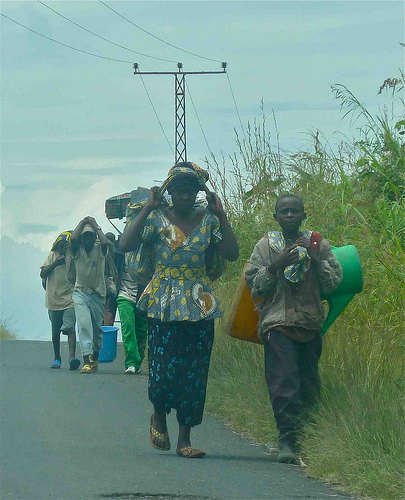This post is part of our special coverage Refugees.
North Kivu in the Democratic Republic of Congo (DRC) is under pressure once again, after two years of relative peace. It all began on March 14, 2012, just days after the International Criminal Court (ICC) found Thomas Lubanga – a key player in the Ituri conflict (1999–2007) – guilty of war crimes and crimes against humanity committed in Ituri, Orientale Province, and of enlisting children under the age of 15 in his army.
The verdict will have concerned Bosco Ntaganda, former chief of the Congolese rebellion of the National Congress for the Defense of the People (CNDP), who has been under an ICC arrest warrant for similar crimes since 2006.
This video by Human Rights Watch explains Bosco Ntaganda's background:
Defection in the army
Just days after the conviction of Thomas Lubanga, former CNDP soldiers responding to General Bosco Ntaganda's orders, defected from the national army. These soldiers had joined the ranks of the FARDC (Armed Forces of the DRC) in 2009, following a peace agreement signed between the CNDP and the Congolese government. In the same agreement, Bosco Ntaganda was also promoted to the rank of general in the armed forces of the DRC.
Mélanie Gouby in Goma writes [fr] about these defections:
Une défection des plus de 300 soldats appartenant à l’ex rébellion du CNDP Congres national pour la défense du peuple CNDP ont désertés les rangs des Forces armées de la République démocratique du Congo (FARDC) L’armée régulière de la RDC en répondant vraisemblablement à L’ordre du General Bosco Ntaganda Commandant des opérations des FARDC au Nord Kivu.
While the defections of soldiers in the regular army continue, the Congolese government is under a lot of pressure from the international community to stop Bosco Ntaganda. Human rights NGOs in North Kivu have also pushed for his arrest, but the Congolese government has remained firm about not seeking Bosco Ntaganda's arrest until recently.
Indeed, he was perceived by the government as a stabilizing factor [fr] in the ever evolving situation in eastern DRC:
Surnommé “Terminator”, le général Ntaganda est visé depuis 2006 par un mandat d'arrêt de la CPI pour enrôlement d'enfants quand il était dans une milice au début des années 2000. Le gouvernement de RDC a toujours refusé de l'arrêter, estimant que la paix dans la région du Nord-Kivu déchirée par une succession de conflits prévalait sur la justice internationale.
Before the conflicts began, the President of the Republic Joseph Kabila claimed during his visit to Goma that he would “never give in to pressure from the international community to arrest Bosco Ntaganda.” Nevertheless, for the first time, he has expressed his intention to hand over Ntaganda.
This statement by Kabila was the tipping point for Bosco Ntaganda's decision to avoid risking a trial. In fact, to emphasize his discontent with Kabila's decision, Ntaganda has decided to go back to the jungles and start a new rebellion. This new turn of events has created a great deal of anxiety among the population living in North Kivu.
Civilians under duress
New clashes have begun in the Masisi and Rutshuru territory, where thousands of displaced persons (IDPs) now find themselves homeless, seeking refuge in non-conflict zones such as Mumbambiro and Goma.
The villages of Sake and Mugunga and even the city of Goma, are currently housing thousands of IDPs living in deplorable conditions. The MUGUNGA III camp, near the city of Goma, shelters more than 6,700 IDPs from Masisi, Rutshuru and Walikale, where fighting continues, according to the head of this camp, Bikorera Claude. He added that on May 4, this same camp came under attack by armed men who left at least five injured.
These movements have also resulted in movements of Congolese refugees into Rwanda [fr]:
Plus de 20.000 Congolais, pour plus de la moitié des enfants, ont fui au Rwanda pour échapper aux violents combats opposant depuis le début du mois l'armée aux soldats ex-rebelles dans l'est de la RD Congo.
Radio Okapi reports that [fr]:
Les réfugiés congolais continuent à affluer au camp de Nkamira, à plus ou moins 20 Km de la ville de Gisenyi au Rwanda. Leur nombre est passé, en l’espace de quatre jours, de cinq mille à plus de sept mille, ont indiqué, ce vendredi 11 mai, des sources locales. Au moins deux mille personnes se sont rajoutées, depuis dimanche dernier, aux cinq mille autres réfugiés congolais enregistrés à Nkamira au Rwanda. Ces derniers ont fui les récents affrontements de Masisi au Nord-Kivu entre les militaires des FARDC et les déserteurs jugés proches du général Bosco Ntaganda.
But according to the testimonies of some IDPs in Mugunga, some of the IDPS who are fleeing all the way to Rwanda are actually from Rwanda and were seeking to return to their home communities.
After the massive displacement of population following the conflicts, the Congolese government has regained control of some of the different communities that were already under control of the loyalist army of CNDP rebels. But will it be possible to find Ntaganga and deliver him to the ICC under these conditions?
This post is part of our special coverage Refugees.








1 comment